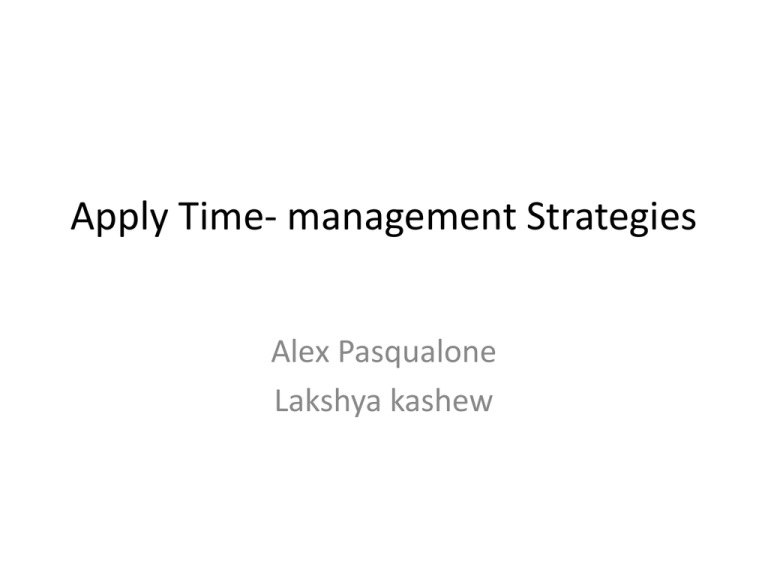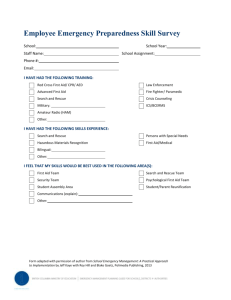Apply Time- management Strategies Alex Pasqualone Lakshya kashew
advertisement

Apply Time- management Strategies Alex Pasqualone Lakshya kashew Orderly and Systematic management principles • 1. Better Efficiency in Delivering Services: Project management provides a “roadmap” that is easily followed and leads to project completion. Once you know where to avoid the bumps and potholes, it stands to reason that you’re going to be working smarter and not harder and longer. • 2. Improved / Increased / Enhanced Customer Satisfaction: Whenever you get a project done on time and under budget, the client walks away happy. And a happy client is one you’ll see again. Smart project management provides the tools that enable this client/manager relationship to continue. • 3. Enhanced Effectiveness in Delivering Services: The same strategies that allowed you to successfully complete one project will serve you many times over. • 4. Improved Growth and Development Within your Team: Positive results not only command respect but more often than not inspire your team to continue to look for ways to perform more efficiently. • 5. Greater Standing and Competitive Edge: This is not only a good benefit of project management within the workplace but outside of it as well; word travels fast and there is nothing like superior performance to secure your place in the marketplace. How can tech enhance time management • Everything is faster and easier to do when you are using technology such as: • Research • Point of Sale systems • Access to information • Some times technology can negatively effective. • Technology can cause many to be distracted and addicted which will lead to less productivity. Examples • Google Docs: – Google Docs is an online collaboration and file management service to help make your life easier. Upload and manage all of your documents, presentations, or spreadsheets to the cloud for easy retrieval at a later time. • Catch the best: – Make the hiring process that much easier. With Catch the Best, you’re able to collaborate with the rest of the team by sharing, rating and tracking job applications and resumes. This team-effort style of hiring helps to ensure the best-fit person fills the empty shoes. • Rescue Time: – Rescue Time is a simple analytics tools to help you understand and monitor the time spent online. To start, tell Rescue Time what you consider to be productive (online brand management) and what’s not productive (online shopping). After each week, Rescue Time provides an in-depth report and shows you the time spent on certain websites. • Phone Tag: – PhoneTag is a service that will convert voice messages to text format, and then send them to you via email. • One Password: – use 1Password to keep track of all your passwords for you. All of your passwords are in one place, and you just remember a single password to access everything. It saves time, and you don't run the risk of losing your password notebook. • Boomerang: – Boomerang is a really cool email app that can save your time in your business. You can use it to control when you receive and send emails, including sending you reminders about emails with a longer shelf life • Calendly: – This works when you want to set appointments, arrange group meetings, and schedule interviews. You can put in your availability, and then those send those who want to set times for meetings can quickly see what's available. • Sortly: – This business tool is all about inventory control. Keep track of everything with the help of Sortly. Make a list of what's in your overstock area. Take pictures of your storage room. This is a good way to make sure that you know where everything is • ZenPayroll: – ZenPayroll can come in for business owners looking for a little help. ZenPayroll makes things easy, and even helps you navigate state and federal tax requirements. It's easy to set up, and once that's done, the system is smooth and time saving. • Trello: – This handy app is a checklist and project management tool. Small businesses can prioritize a to-do list, set deadlines, reorder tasks and share the list with others 5 time management techniques used by successful executives • Eliminate the Unnecessary – Eliminating the “unnecessary” in life goes a long way in making you more productive • Plan Your Work – • Set aside ten to fifteen minutes before work and either write down or mentally plan what you want to accomplish Multitasking – Reduces work but if you can’t do it, don’t try. It’ll lead to sloppy and poor work. • Know when to Multitask – Try to accomplish as many of them as I can at once and as fast as I can. But when my boss gives me a special project that he needs done in a timely fashion and of the highest quality, the time that I devote to that is usually uninterrupted and I usually concentrate on nothing else other than that project • Reduce interruptions – you can’t reduce the number of things that are going to interrupt you, but you can alter the fashion in which you deal with them Consequences of Poor TimeManagement • • • • • • • • • • Poor Punctuality Rushing Impatience Poorly Defined Goals Procrastination Poor performance Lack of energy Perfectionism Indecisiveness Saying ‘Yes’ to everything
